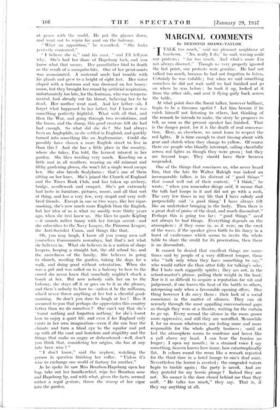MARGINAL COMMENTS
By DESMOND SHAWE-TAYLOR
" TALK too much," said my pleasant neighbour at luncheon. "No, really I do," he said, waving aside our protests ; " far too much. And what's more I'm not always discreet." Though we very properly ignored the last point, our protests were genuine. He had not talked too much, because he had not forgotten to listen. Certainly he was voluble ; but when we said something ourselves he did not wait until we had finished and go on where he was before : he took it up, looked at it from the other side, and sent it flying gaily back across the table.
At what point does the fluent talker, however brilliant, begin to be a tiresome egotist ? Let him beware if he catch himself not listening to others, but thinking of the remark lie intends to make, the story he proposes to tell, as soon as the present speaker has finished. That is the danger point, for it is the death of real conversa- tion. Here, as elsewhere, we must learn to respect the red lights. It is time enough to start fussing about with gear and clutch when they change to yellow. Of course there are people who blandly interrupt, sailing cheerfully: across red lights as though they were green ; but they are beyond hope. They should have their licences suspended.
One of the things that convinces us, who never heard him, that the late Sir Walter Raleigh was indeed an incomparable talker, is his distrust of " good things " that sound well out of their context. " I think," he wrote, " when you remember things said, it means that the talk had lumps in it and did not go with a rush. The very few times in my life that I have calmly and purposefully said ' a good thing,' I have always felt like an undertaker bringing in the body. Then there is a great deal of praise of the dead, and much discomfort." Perhaps this is going too far " good things " need not always be bad things. Everything depends on the atmosphere : if they come in, as it were, on the crest of the wave, if the speaker gives birth to his fancy in a burst of exuberance which seems to invite the whole table to share the credit for its procreation, then there is no discomfort.
It cannot be denied that excellent things are some- times said by people of a very different temper, those who " talk only when they have • something to say," who would rather die than utter folly for talking's sake: But I hate such niggardly spirits ; they are not, in the school-master's phrase, pulling their weight in the boat. Nor is it so difficult to acquire a reputation for wit and judgement, if one leaves the heat of the battle to others; interposing only when a favourable opening offers. One thing however I do envy them : their lack of a social conscience in the matter of silences. They can sit serenely through the most appalling conversational gaps as though they were at a theatre, waiting for the curtain to go up. Every second the silence in the room grows more oppressive, and still they are unruffled. Meanwhile I, for no reason whatsoever, am feeling more and more responsible for the whole ghastly • business ; until at last the atmosphere seems to condense and liover like a pall above my head. I can bear the tension no longer ; I open my mouth ; in a strained voice I say something, heaven knows how inane, how. catastrophically flat. It echoes round the room like a remark repeated for the third time in a hotel lounge to one's deaf aunt. Nevertheless the horror is averted ; the congealed waters begin to trickle again ; the party is saved. And are they grateful for my heroic plunge ? Indeed they are not. No sooner is the door closed behind me than they sniff: " He talks too much," they say. That is, if -- they say anything at all.






















































 Previous page
Previous page